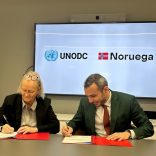Mozambique: Malaria killed 16 since January in Tete province
Higher education face-to-face classes and religious services to resume this Tuesday

Picture: Wikimedia Commons
In the midst of heated debates about the legal framework, the President of the Republic (PR), Filipe Nyusi, announced last August 5th a new State of Emergency, in the context of preventing and combating the Covid-19 pandemic. The new State of Emergency, in this case the second, began to take effect on the 8th of the current month, with completion scheduled for 11:59 p.m. on the 6th of September.
Despite much discussion, the second State of Emergency marked the easing of restrictive measures throughout the national territory, that is, the gradual resumption of activity in some sectors.
According to the schedule announced by President Nyusi, the first phase of the “de-confinement” (easing) starts this Tuesday (18th), with the resumption of activity in some sectors, and the resumption of face-to-face classes at public and private universities and higher education establishments across the country.
The first phase of relaxation of the measures includes low-risk activities. Phase Two, which includes medium-risk activities, begins on September 1st. And Phase Three, which includes high-risk ones, is due to start on the 1st of October.
In particular, face-to-face classes at higher education institutions will resume this Tuesday in academies and schools of the Defence and Security Forces; in technical-professional education; health training institutions and centres; and public professional training.
The re-opening takes place at a time when the number of cases is growing exponentially, threatening the already weak National Health System.
Last Saturday (15), the health authorities reported the registration of 80 Covid-19 cases in 24 hours. This Sunday, the Ministry of Health announced the registration of another 64 Covid-19 cases in the previous 24 hours. Cumulatively, the country had registered 2,855 cases of the disease up until yesterday.
The resumption of face-to-face classes has never from the first been an option favoured by the majority of citizens, with the most radical even proposing the annulment of the current academic year. The increase in the number of cases, the lack of hygiene and safe conditions in schools and even the time left until the end of the academic year have featured in arguments for not returning to the classrooms, or even for cancelling the academic year. Some have even argued, when the possible return to classes was still being discussed, that students should not be guinea pigs.
The return to face-to-face classes at educational establishments was already scheduled for July 27th. Amid widespread contestation however, the president, addressing the nation on the occasion of the assessment of the third extension of the State of Emergency, withdrew the decision to resume classes, arguing that hygiene and security conditions had not yet been met.
Also in the aforementioned communication, Filipe Nyusi had determined to maintain the restriction on the holding of “face-to-face services”, which left the religious elite on the verge of a nervous breakdown, despite weeks before having set up camp at the office of the head of state.
A document referring to the phases and scenarios of the gradual resumption of face-to-face classes at the country’s higher education institutions was circulated just before the weekend by the Ministry of Science and Technology, Higher Education and Technical Professional Training. The document foresees three phases, accompanied by the respective scenarios, noting that each higher education institution must adjust their calendar according to specifics and the nature of the courses they teach.
In the first phase, face-to-face classes for the last year or level of each undergraduate and graduate course are restarted. This phase, says the document, includes the consolidation and recovery of classes, assessments and exams. The first scenario comprises the period from 18 August to 11 September, in which those courses which continued with the process of teaching and learning using electronic platforms concluded the first semester.
Still in Phase One, but already in the second scenario, from August 18 to October 23, those courses that had classes using digital platforms and did not have practical, laboratory and internships conclude the first semester. In scenario three, which runs from August 18 to December 4, those courses that were not taught are taught and conclude the first semester. In the fourth and final scenario of the first phase, which runs from December 7 to March 27, 2021, those courses that were not taught are to be taught and conclude the second semester.
In the document, the second phase deals with the extension of the 2020 academic calendar until May 7, 2021. Here, face-to-face classes for the other years or levels are restarted. For this phase, according to the dispatch, only one scenario is on the table, where the first semester runs from October 26 to January 8, 2021 and the second from January 11 to May 7 2021.
The document quoted sets the second half of May 2021 for entrance exams, and establishes a single calendar from June 2021 to March 2022. New entries and all years are to start in the second half of June 2021 and will extend until March 2022.
Churches open their doors this Tuesday
In addition to the resumption of face-to-face classes, the easing will also see the return to face-to-face religious services, in response to the clamour of the religious elite.
However, the resumption of religious services is to be carried out under constraints. As announced by Filipe Nyusi, the number of participants in religious services must not exceed fifty people. Hygiene in places of worship is paramount in preventing them from becoming loci of Covid-19 propagation and transmission.
The resumption of face-to-face services is seen as a life-saver for religious congregations, who were on the verge of winding up, the declaration of the State of Emergency having deprived them of the contributions of the faithful. Some religious congregations temporarily initiated electronic payment channels available for “tithes”.
Some despairing congregations opted to meet in a clandestinely in defiance of the state of emergency regulations.
This Tuesday also marks the increase in the number of participants permitted at funeral ceremonies to a maximum of 50, except when Covid-19 was the cause of death, in which the number will remain at 10.
The second phase of the relaxation of measures (September 1) will be marked by the full resumption of technical and professional education; the opening of cinemas, theatres, casinos and gyms; and of driving schools and the practice of motor sports. In the third phase (October 1st), Grade 12 classes resume.
The resumption of primary and secondary education is dependent on the verification of conditions imposed by the health authorities and inspection bodies, taking into consideration the evolving trend of the pandemic in the country.
The resumption of public sporting events is also dependent on the verification of the conditions imposed by the health authorities and the evolution of the disease in Mozambique.
By Ilodio Bata












Leave a Reply
Be the First to Comment!
You must be logged in to post a comment.
You must be logged in to post a comment.